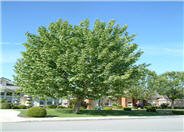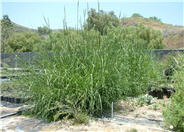
Common name:California Sycamore
Botanical name:Platanus racemosa
The California Sycamore is a fast growing deciduous tree that reaches up to 40'-50' high. It tolerates heat, smog, as well as moist conditions; it is native to riparian areas. It can be drought tolerant once it's established if there is a high water table. It has interesting mottled bark when the tree is bare in winter. Leaves in fall are gold, red and orange, creating litter. It is beautiful all year round.

Common name:Giant Wild Rye
Botanical name:Leymus condensatus
This prominent, tall native grass does not make its way into traditional residential landscapes but can be used very effectively in a native or natural garden. It reaches heights of 6'-8' when blooming and will clump to 4'-5' wide. It requires supplemental water to remain green in the summer. Too much water will cause the grass to decline significantly. It can be pruned annually to promote new, more attractive growth. Tall grasses are highly combustible.

Common name:Blue Fescue, Blue Fescuegrass
Botanical name:Festuca glauca
This groundcover/grass will grow less than 1' tall and has small, blue green leaves.

Common name:Rosemary
Botanical name:Rosmarinus officinalis
Rosemary is hardy in full sun areas where winter temperatures do not drop below 10 degrees F. They can be grown in a clay pot with well-drained, porous soil in bright indoor light, and will also flourish on the backporch in spring, summer and fall. Its beautiful, slowly trailing stems and shiny slender leaves are perfect for showing off the small, light blue flowers that blossom in the summer. -Holland WIldflower Farm

Common name:New Zealand Flax
Botanical name:Phormium tenax
New Zealand Flax is a large, bold plant with stiffly vertical, sword-like, green leaves that arise from its base. It should be grown under full sun for best color. Varieties will offer different growth habits and leaf color.

Common name:Silver Lace Society Garlic
Botanical name:Tulbaghia violacea 'Silver Lace'
This evergreen perennial has 1'-2' long stems with white, margined leaves and rosy/lavender/pink flowers that bloom in spring and summer.
| Designer: Jane Gate | Restful Paradise |
Photographer: GardenSoft |
Soils and Compost:
Practice grass-cycling by leaving short grass clippings on lawns after mowing, so that nutrients and organic matter are returned to the soil.
Water Saving Tip:
In general, lawns only need to be watered once every three days.
Check your irrigation controller and reduce watering times if necessary.
Integrated Pest Management:
Remove irrigation water and fertilizer from areas where you don't want weeds to grow.
